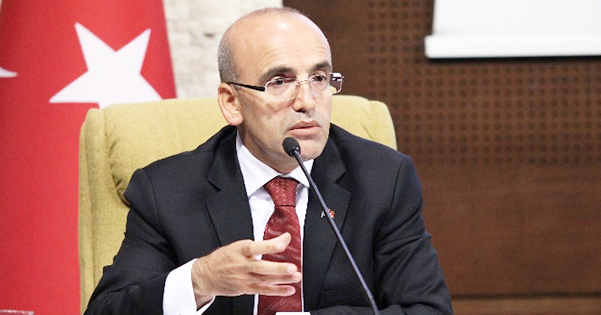Turkey is studying the forex debts of its private sector and will take new macro-prudential measures, Deputy Prime Minister Mehmet Şimşek has said, adding that measures would include new forex restrictions.
Şimşek said the real sector was in a seriously open position in terms of foreign exchange debts.
“Regarding the additional open positions, we will develop macro-prudential measures. These measures will likely come online” said Şimşek in a televised interview, as quoted by Anadolu Agency.
He reminded that the country strictly limited people’s borrowing on foreign exchanges after the 2008 global economic crisis.
“We did this, luckily. Otherwise, we would have faced a serious problem regarding individuals’ debts,” said Şimşek.
“We took households under protection against the interest rate and foreign exchange rate risks. We have actually done the same thing for small- and medium-sized enterprises (SMEs) as well, but it seems that these measures were insufficient,” he said.
Şimşek also said Turkey was technically not in recession as industrial production continued to grow moderately, albeit not at desired levels due to ongoing uncertainty.
Still, the deputy PM said he expected the uncertainty to disappear after a constitutional referendum in April.
“Fourth-quarter growth data was not bad. Automotive sales especially saw a 19 percent increase in the last quarter of 2016 compared to the same period of 2015. We also saw a year-on-year increase of 10 percent in home appliances sales and 15 percent increase in property sales. The domestic demand was quite lively in the last quarter. So was the industrial production. From this perspective, Turkey was technically in recession, as fourth-quarter data showed moderate growth,” he said.
Şimşek said 2017 first-quarter data also indicated moderate growth, although not at desired levels.
According to Şimşek, the economy could rise in a rapid manner if a strong reform agenda is realized after the referendum, as “there is not a big problem in the fundamentals of the Turkish economy.”
“Yes, there are some structural problems, but we will resolve them through reforms,” he said.
Şimşek also said some positive impacts of the loss in Turkish Lira’s value had started to be seen in exports.
“Almost all European Union members are growing. This is a quite exceptional case. A moderate strengthening in the domestic demand in the EU, our largest market, and a recovery in the energy-rich neighboring countries of Turkey have positively affected our exports,” said Şimşek, adding that no rebound in investments had occurred due to existing uncertainties.
#foreign, #exchange, #debts, #macroprudential, #measures, #DeputyPrimeMinister, #forex, #restrictions













